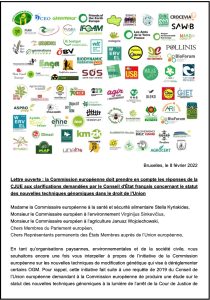Biotechnologies génétiques / Nouveaux OGM
New GMOs: EU Must Uphold and Strengthen Regulatory Framework
New-generation GMOs pose the same risks to pollinators as as their older-generation counterparts. Their potential to contaminate surrounding plants and crops make coexistence with organic farming impossible. Stringent health and environmental risk assessments to protect pollinators and ecosystems must therefore be enforced.
GMOs are regulated in the EU by Directive 2001/18, mandating strict traceability, labelling requirements, and health and environmental risk assessments. This has shielded European agriculture from uncontrolled spread of transgenic organisms. However, the agrochemical industry has persuaded European authorities to exempt new genomic techniques (NGTs) from these obligations. The draft regulation presented by the European Commission envisages exemption from authorization, risk assessment, and labelling for NGTs.
New-generation GMOs pose the same threat to pollinators as their predecessors. The risk assessment exemption poses unacceptable risks to pollinators and the environment. Genomic changes introduced by new GMOs cannot be contained, and their presence in agriculture can devastate organic farming and pollinator-friendly practices and infringe upon consumer’s right to choose GMO-free food. A major shift in the rules is being negotiated without public debate.
In light of the risks posed by these new GMOs to pollinators and ecosystems, and in order to avoid genetic contamination that would spell the end of organic farming that respects living organisms in Europe, POLLINIS and the 1.2 million citizens it represents firmly believe that MEPs must imperatively:
- reject the European Commission’s proposed regulation on plants obtained by certain new genomic techniques and their food and feed, so as to ensure that new generations of GMOs must comply with current regulations on genetically modified organisms (Directive 2001/18/EC):
- guarantee the application of the precautionary principle by reinforcing the risk assessment of all GMOs on the environment, and in particular on non-target arthropods such as pollinating insects.



